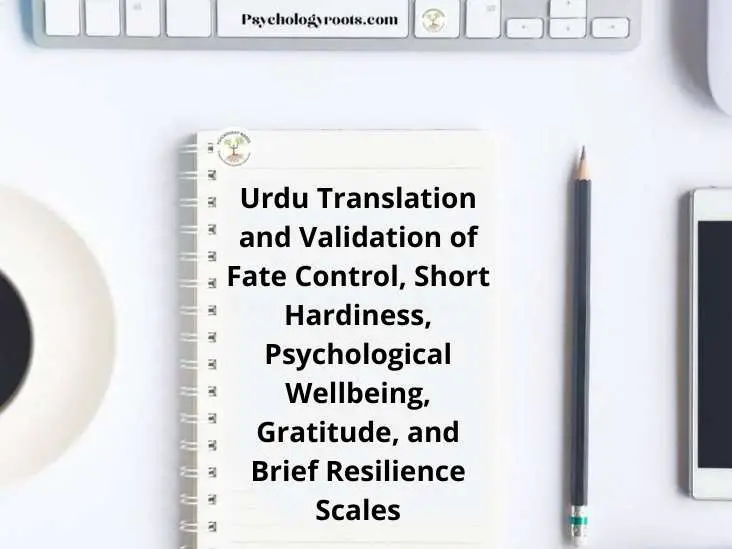Table of Contents
Urdu Translation and Validation of Fate Control, Short Hardiness, Psychological Wellbeing, Gratitude, and Brief Resilience Scales
Here in this post, we are sharing the article on “Urdu Translation and Validation of Fate Control, Short Hardiness, Psychological Wellbeing, Gratitude, and Brief Resilience Scales”. You can read the abstract of the article with a download link. We have thousands of articles in our collection (See articles). You can demand us any article related to psychology through our community, and we will provide you within a short time. Keep visiting Psychology Roots.
Abstract of the Article
The current study aimed to translate and validate the Fate Control scale, Short Hardiness Scale, Psychological Wellbeing Scale, The Gratitude Questionnaire, and Brief Resilience Scale. The study comprised of three phases; phase-I was the translation of the scales by using forwardbackward translation method. In phase-II, cross language validation was established on a sample of 60 (male=25, female=35) bilingual young adults of age range 26 to 31 years (M=27.75, SD=1.29), selected through a convenient sampling technique.

Urdu Translation and Validation of Fate Control, Short Hardiness, Psychological Wellbeing, Gratitude, and Brief Resilience Scales
They were divided into three equal groups. Each group was given all versions of the scales (i.e., Urdu, English, and Original) in three slots to analyze inter-versions correlations. Significant positive inter-correlations were found between original, forward translated, and backward translated versions of the scales. In phase III, the reliability and validity analyses were run to establish the psychometric properties of the translated versions. Confirmatory factor analysis (CFA) was carried out to confirm the factor structure of the translated versions of the scales on a sample of 200 individuals (male=142, and female=58) of age range from 24 to 50 years (M=33.62, SD=6.72). Furthermore, the convergent and discriminant validity of the translated instruments was assessed to establish the construct validity. Results supported the original structure of the scales.
Authors of the Article
- Muhammad Zohaib Khan
- Syeda Shahida Batool
Avail Article [sociallocker id=64051]
[/sociallocker]
Need Any Other Article:
Are you looking for any other article? Don’t Worry, We provide you free and quickly. Just need to create a query in our community.
Information:
The purpose of our website is only to help students to assist them in finding the best suitable instrument for their research, especially in Pakistan where students waste a lot of time in search of the instruments. It is totally free of cost and only for creating awareness and assisting students and researchers with good research. Moreover, it is necessary for you to take the permission of scales from their representative authors before use because copyrights are reserved by the respected authors.
Help Us Improve This Article
Did you find an inaccuracy? We work hard to provide accurate and scientifically reliable information. If you have found an error of any kind, please let us know.
Add comment. we appropriate your effort.
If you have any scale or any material related to psychology kindly share it with us at psychologyroots@gmail.com. We help others on behalf of you.
Follow
2 comments
Aoa! please send me the scale. I could not download directly
Aoa! please send me the scale. I could not download directly